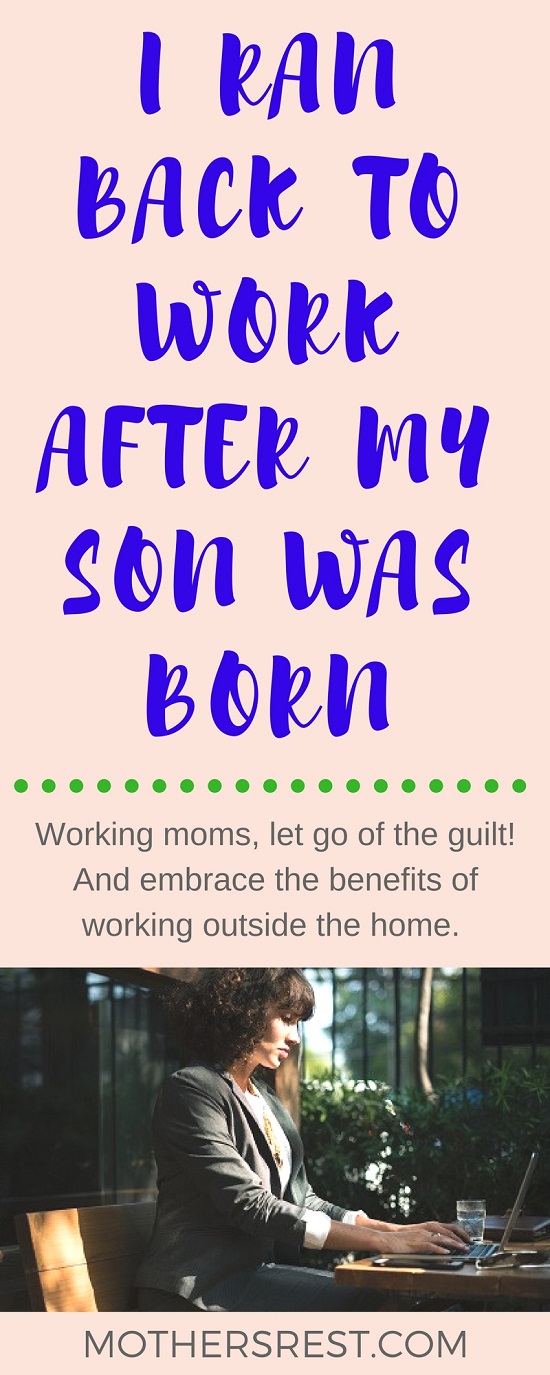I was never meant to be a stay-at-home mom. I knew this at age eight. When I asked my own stay-at-home mother what she did all day. I thought it consisted of playing bridge with her friends, eating cashews, arranging flowers for garden club, and reading books.
Of course, my mother did 50 million other things. I know that now. But to my 8-year-old self, I thought she had it pretty easy.
When my youngest sibling left for college, my mom contemplated getting a job. She’d been a kindergarten teacher once, so the local private school tried to recruit her. Except she “forgot” to go to the final round of interviews. More likely she wasn’t up for leaving behind the freedom and routine she’d claimed for herself, even in the midst of the 50 million things moms do to care for a household, with or without children hanging on you.
But when my first son was born, I couldn’t run back to work fast enough.
Maternity leave in the US
Actually, it was more of a quick stroll. I am one of the lucky ones who got 13 weeks of maternity leave and a husband who got a month of paternity leave. Plus, I work for an amazing nonprofit that let me work from home twice a week those first 9 months.
I didn’t experience the heart-sickening dread of leaving a 6-week-old newborn in the care of a stranger. It’s unconscionable what mothers must do to support their families. Maternity leave in this country is deplorable.
In a recent study of maternity leave among highly developed countries, the US is the only one that doesn’t offer paid leave. One explanation for this is World War II:
“The European social democracies that emerged after WWII all wanted paid leave policies (some had them earlier) in part because of their concern about replenishing the population,” Ruth Milkman, a professor of sociology at CUNY, wrote in an email.
Europe suffered both massive casualties and massive damage to its infrastructure, Milkman explains, and it needed to get more people into the workplace. That meant helping women get into work. Meanwhile, when the U.S. troops came home, it meant less of a need for women in the workplace.
“Here in the U.S., while the war was going on, you had women in jobs in factories and in all kinds of jobs the men had held. But women went home” when the soldiers returned from the war, explains Debra Ness, president of the National Partnership on Women and Families. And with all of those women returning to the home, there was less of a reason to create policies that helped them stay in the workplace.
–Danielle Kurtzleben, NPR
Which brings us to today, without consistent maternity leave options for families across the income spectrum. Think about it – how many single moms can CHOOSE to stay at home when a paycheck equates to survival?
I do have a choice to stay home or work outside the home. I choose the later.
And this saved me after my son was born.
The benefits of work
Sleep deprivation was a shock and threw me into a place of rage. On top of all this, I’d never cared for a newborn before. I’m not even sure I’d ever changed a diaper before.
But at work, life made sense. It helped me feel normal again. It was my refuge, my lifeline back to my former self. I was happy at work. I was productive. I could connect with other women – kinda like having a wine date without the wine without the hassle of preparing bottles or scheduling a sitter. I could run errands during lunch without dragging along a screaming infant.
Eventually I learned to harness the joy I found at work and bring it home. It took months, but work was my link to living again. To becoming the mother I’d dreamed of being.
I say to those of you who MUST return to work and to those who WANT to return to work, punch working-mom guilt in the throat, strike a power pose and walk out the door, embracing the day and all it will bring you. You may find a kernel of joy there that will benefit you personally, that will infuse your world at home with newness.
And it may give you insight into the decisions your own mother made to work at home or the office. Because sometimes our dear mothers are elusive creatures, who just want to arrange flowers and work with their hands, using talents we neither possess nor understand. Because just maybe that’s their definition of work.
Share your own working mother insights below or on Facebook at MothersRest.
Photo credit: rawpixel.com via Unsplash.com
ADDITIONAL THOUGHTS
Love this comment shared on Facebook:
I love this article! It’s exactly how I felt. Before my daughter was born I had never spent more than a few minutes in the same room with an infant! At work, things made sense and I was in control. In fact, it really wasn’t until my daughter was six months old that she and I even started bonding.

